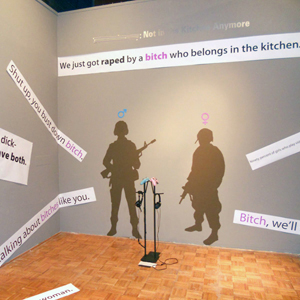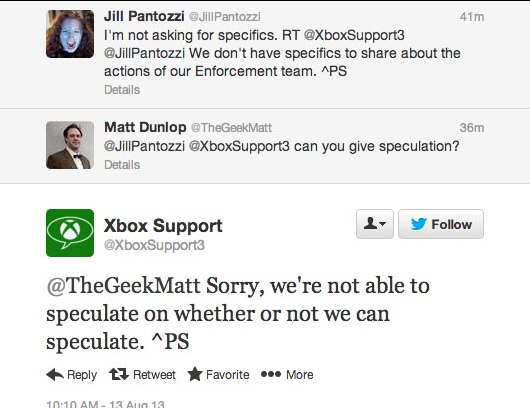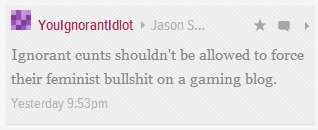Don't Be a Dick… Especially if You Have One.
In 2007 Will Wheaton uttered a simple phrase while giving a keynote at PAX that turned into a universal motto in the gaming community: "Don't be a Dick." Six years later it seems as if that message may be fading under the high tide of the digital age. Being online hasn't just become a hobby for people; it's become a way of life. The more comfortable we get with being able to share our opinions instantly on a whim, the more likely it is for most of us to say something stupid or insensitive to another human being. Like this:
Would you ignore it? Would you shrug it off and continue to play games in the same vicinity as this ass-hat of a human being even if it was an online space? Well, that's the advice given to women who receive these kind of threatening messages while playing video games online. I'm aware that a certain amount of trash talk is warranted when playing competitive multiplayer games on any platform, but I think we need to admit that when the trash talking goes too far it's usually directed at a female, simply because of the fact that she is a female.
Jenny Haniver is one of those females, and her primary multiplayer game of choice at the moment is Call of Duty: Black Ops 2. In 2010, she began recording in-game audio of her Call of Duty matches so that she could implement them into an art installation at her college. Banners lining the walls and floor displayed the worst quotes she collected from people who accosted her online. The centerpiece of the exhibit was a pedestal on which she placed two controllers with MP3 players built in and headphones attached to them so that people could interact with them. One controller was blue and played audio that men normally hear while playing video games online and one controller was pink, playing the audio that she normally hears online.

After putting together the art installation she decided that she wanted to keep documenting the harassment she was continuing to receive on a regular basis. That is when she created her website, Not in the Kitchen Anymore. It's where she posts transcripts, audio files, and screen grabs of the more horrific and obnoxious interactions she's had while playing multiplayer games. Jenny also goes a step further and has a section where she documents the reactions of commenters on articles that discuss the work she is doing on her website. Those comments can sometimes be worse than what she' hears in-game because there are many people who think she is just doing this for the attention, which she isn't. At her core she is an artist and this website she created is her form of expression.
Last weekend I had the honor of speaking with her via video chat and got a better insight into why she continues to document this cyber-harassment. One important fact is that she never provokes other players in a public lobby by announcing that she is a woman. Usually random players in a lobby will see her name in her Gamertag and start hounding her right away. This happens to her so often that she has a backlog of audio files ranging back two years that she hasn't gotten a chance to transcribe on her site yet. What you see on her website are excerpts from the worst cases.
Even as I was finishing up this article, she posted a transcript from a Black Ops match she played with a few friends this week. Some Random Male Players (RMPs) who sounded like they were in their late teens or early twenties, started harassing her. If you want to read the full transcript and listen to the audio recording, it's on her website. The following statement is an excerpt that truly shows the lack of intelligence they possessed:
The incident that caused her twitter storm campaign for retribution earlier this month occurred around July 27th. It began like most of the incidents, with the perpetrator singling out Jenny after realizing she was a woman. Phatdog was his name, and during the match he asked if she was on her period and began making bad jokes and saying she was ugly because she was a female gaming online. Standard idiot logic. Phatdog topped off his insults by sending Jenny a voice message after the match saying that he wanted to impregnate her and give her a "late-term abortion." You can listen to Prince Charming’s voice in this video, from Jenny's YouTube channel.
If you want to read the full documentation of the incident and all other things related to it getting resolved, you can read about it here. (continued on the next page)
She reported him with the Xbox 360's complaint system, hoping that something as appalling as the voice message would be all the evidence necessary for action to be taken against him. She checked back almost a week later and saw that Phatdog was still active. That's when she started to tweet @XboxSupport, asking them why a player who sends rape threats had not been banned in over a two-week period. They responded by stating that they couldn't comment on specific cases, which is understandable but still oddly tainted with the scent of bullshit. Even Jill Pantozzi from themarysue.com ran into roadblocks when inquiring about the situation for an article she wrote about this.

I know many people reading this may be thinking that muting or blocking someone online is a quick fix to solving this issue but it’s a strategy that often does not work the way it is intended. I’ve seen recent forums where people complain about blocking someone only to find them in a public match the next time they are online because the individual finds them through a friend who has not blocked them.
There is a lot of mixed information on how to handle these predicaments because in theory, they shouldn’t be happening at all. Some solutions include setting your account status to offline and making sure to avoid public matches for a week or two, allowing the harasser time to forget about you and move onto their next victim. Then you run the risk that they may not forget about you or they figure out whom you play with regularly and find away to seek you out through some other means. If you currently experience this kind of activity, there’s no full proof way to solve the situation other than engaging in a cyber game of hide and seek.
There is a priority problem with the way harassment claims are responded to through the current Microsoft system. Jenny Haniver was on a TwitchTV broadcast with the Gaming Anarchist Collective last Friday and one of the commentators talked about how they had received an 8-day ban almost immediately after posting an image that criticized Bill Gates on their profile. It took almost a month and an incredible amount of social media pressure for Microsoft to take action against Phatdog, a gamer that felt the need to threaten rape and forced abortion on another human being without much provocation. If Jenny had taken the route of least resistance, this player would have just moved onto victimize someone else. Back in 2012 she received a rape threat, reported it, and nothing ever happened to the person who sent it. As of April 2013 he was still active on Xbox Live.
Just because something happens online doesn’t make it any less important than something that happens offline. Verbal abuse can be just as detrimental as physical abuse especially when it exists in a space where it shouldn’t. When you play video games online, you should have a harassment-free experience and when someone purposely goes out of their way to single you out and threatens you, there should be more immediate consequences. Microsoft has said that the Xbox One will be harsher on people who are banned by not allowing them to play certain games during the duration of the suspension by, preventing them from playing games that require an online license to play. This isn’t a bad thing, but if the claims being received aren’t processed in an effective manner, it’s not going to change anything.
Another major flaw is in the blocking system. While it is effective in preventing future messages from a certain user, it also can prevent you from filing legitimate claims against them if they have also been sending you voice- or text-based threats. The following quote was pulled from an official Xbox Live forum that details all aspects of filing a claim:

If you need to block someone who is sending you harassing messages and you block them before you file a complaint, you’re shit out of luck. Unless they are also violating any of the other complaint worthy infractions, you have no evidence to submit a valid claim against them. This is a built-in system that makes it possible for Xbox Live customers to delete evidence of online harassment unknowingly. Still don’t get it? This GIF I made might help you out:

If they continue this on the Xbox One, there should at least be a notification that pops up when you are going through the process of blocking someone, instead of burying it in the terms of service.
Then there's the issue with the way in which complaints are received. If you’ve been threatened the way people like Jenny Haniver has, with rape or physical harm, your report is lumped in with all other types of claims no matter how minor. There should be sub-categories that allow harassing voice and texts messages into categories like racial slur, sexual harassment, death threat, or use of profanity. Perhaps if they had these additional subdivisions in the complaint process, they’d be able to more easily identify which category a claim fell under instead of digging through them all to get to the most inflammatory ones. Why is this so difficult for them? (continued on the next page)

If they did use the banhammer more often, then maybe people who want to have the freedom to send hate-filled messages to people may not want to pay for an Xbox One and a fancy Gold membership. Instituting a system where violators of online conduct codes can co-exist with people who do not harass people is the current situation for Microsoft. Perhaps they’re afraid that banning the actual amount of people who behave this way online would lose them a ton of money. Regardless, I think adding some extra manpower to the moderating pool would at least help send a message to people who think it’s okay to go beyond the bounds of a public lobby and send people threatening messages. Maybe they could put the extra billions of dollars they’re planning to make off the cost of the Xbox One toward increasing the amount of people they have moderating Xbox Live complaints.
The only glimmer of hope we may see regarding this issue next-gen is the reputation system. In a statement to OXM, Mike Lavin stated the following:
“…There’ll be very good things that happen to people that just play their games and are good participants. And you'll start to see some effects if you continue to play bad or, or harass other people en masse. You'll probably end up starting to play more with other people that are more similar to you."
Jenny Haniver has heard of this new upcoming approach to reputation-based matchmaking on the Xbox One and appreciates the “prisoners island” approach to it. However, if there are instances where people making nonchalant claims can lower someone to the “avoid me” status, then I suspect there will be some rather harsh blowback from the Xbox Live community. This is something Lavin stresses will not happen, but we’ll have to wait to see it in action.

There’s more at work here than logistics. I don’t like singling out Xbox, and I don’t like admitting that female gamers are the targets of most harassment that occurs while playing multiplayer games online. If you still don't want to accept that as common truth, then you should really explore the transcripts on Not in the Kitchen Anymore and see it for yourself. Before I saw Jenny Haniver on last week’s episode of Minus World, I didn’t want to admit that women are more singled-out online than men. I don’t play online games too much, so it was easy to fall into denial and forget that things like that are an everyday occurrence.
Jenny Haniver isn't looking for attention. In fact, the only spotlight she wants is the one that needs to be sharply illuminating this problem. This is something that needs to be publicized more and right now she's the only person online doing the most in depth reporting on it. Some may criticize her for using her full name in her Xbox Live tag but you know what? That's her choice. (Would a man using his full name receive the same treatment?) She doesn't enter public lobbies and announce that she's a women or goad strangers into being assholes toward her. She just wants to enjoy a game she loves in a social online enviornment like anyone else who plays multiplayer games.
Most of the advice women are given when reporting online harrassment is not to advertise that they are women in their screenname or not to use a microphone when playing online so people won't know their gender. Frankly, that's not the advice you give to someone if you're looking to solve a problem, but advice you give to someone if you're trying to avoid a problem. The Guardian posted an article about an MMORPG player who had been given that advice after complaining of harrassment and things didn't work out so well for the young woman in the article. Someone in the company she was reporting claims to ended up getting so fed up with her reports of harrassment that they sent out all her information to the MMORPG community she was a part of and she ended up having to change all of her social media contacts and her telephone number because she was getting harassed even more. She was also banned permanently.
Jenny's put the same advice to the test with a twist, by creating a fake screename that was incredibly feminine, which she uses when she gets free Xbox Live Gold cards that come with certain games. When playing online under her alias, she still uses a microphone so people know she's a woman and doesn't behave any differently. The scary fact is that she has NEVER been harrassed while using her secondary Gamertag, but as soon as she switches back to her normal one, the insults and threatening messages start up again.
I know that even after reading all this, some you may be thinking that she's still doing this for the attention and I'm just fueling the flames of contorversy. So I asked her about how she would feel if the next generation of Xbox Live did what it promised to do? What if the reputation system succeeds in funneling all of the ignorant assholes into multiplayer purgatory together and she ends up with less material for her website? Would she be disappointed?
She responded with the following:
Hell no. I would be ecstatic if it got to the point where I couldn't update my website frequently anymore, or at all. I think it would be great if gaming got to the point where the times of harassment and weirdness I highlight on my website was nonexistent… Or at least a lot less prominent.
What she is doing is incredibly important. This is not her day job. She is not doing this for the money and she isn't doing it for the fame. She is doing this to show how women are treated when they play online multiplayer games. No amount of criticism or victim-shaming, like the kind seen on websites like Gamers Association will prevent her from displaying the realities of what it's like to be a woman in an online gaming world.











